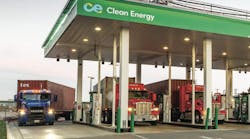The going is tough these days. Delays are more widespread and more unpredictable as checkpoints, road closures and evacuations pop up without warning. Drivers and others are being called up on short notice for National Guard or Reserve duty. Freight volumes are shrinking and some customers are having trouble paying. For everyone, anxiety is rampant — about anthrax, bomb scares, job cuts…what's a carrier to do?
A lot, actually. Start with communications. Let employees and contractors know that you care about their welfare. Let them know what steps you are taking to protect them and look out for their interests. Communicate with customers, too. If you are having to make adjustments in pickup or delivery times or in people they're used to dealing with, tell them why. Try to work with them to solve the problems these disruptions may be causing them — don't just focus on your own worries.
Now for the hard part of communications. If your financial circumstances are deteriorating, don't hesitate to decide on changes. Then implement — and communicate — those changes promptly. It isn't unpatriotic to drop employees or customers who are no longer contributing to your profitability or your strategic plan. And it does nobody a favor to drag out changes; in fact, you lower morale and productivity of your workers if they keep wondering what is coming next. (Make sure you know what federal and state laws apply to terminating workers, however. Don't compound the misery by providing grounds for a discrimination complaint.)
Tough times have a good side, too. Even if you have to shrink your business, you may be able to get more selective about which workers, facilities and customers you work with so that you can focus on your best prospects for long-term growth and profitability. By sticking with certain customers who are experiencing difficulties, you may cement their loyalty and get added business opportunities in the next upturn. Be alert for competitors who are dropping workers or customers you may want to woo.
These are good times for buying trucks and fuel. If you expect to stay in business long enough to make it into the next expansion, see if you can pre-order equipment for later delivery. Not only have equipment prices been dropping, but interest rates to finance vehicles are at historic lows. And fuel prices have come down further than anyone was predicting a few months ago. Now may be the time to lock in future fuel deliveries.
Take a look at the pay, benefits and working conditions you offer. If you find yourself losing your best workers to your competition and being left with the mediocre ones, see if you can identify what the good ones are getting elsewhere. On the other hand, don't automatically enrich compensation across the board. All types of insurance, for instance, seem headed for even bigger premium hikes next year than earlier surveys had indicated. So you may want to freeze the amount you spend on insurance in favor of providing more pay or other benefits. For example, if drivers' families — or customers — are anxious about where drivers are, invest in better mobile telecommunications.
The bottom line: More than ever, it is clear that we don't know what tomorrow will bring. The way to prepare for such uncertainty is not to stand pat. Instead, plan how to expand, cut back, or get out of business altogether — on your terms, not as the next day's headlines dictate.


